
The Eastern Orthodox Church, officially the Orthodox Catholic Church, and also called the Greek Orthodox Church or simply the Orthodox Church, is the second-largest Christian church, with approximately 230 million baptised members. It operates as a communion of autocephalous churches, each governed by its bishops via local synods. The church has no central doctrinal or governmental authority analogous to the pope of the Catholic Church. Nevertheless, the Ecumenical Patriarch of Constantinople is recognised by them as primus inter pares, a title formerly given to the patriarch of Rome. As one of the oldest surviving religious institutions in the world, the Eastern Orthodox Church has played an especially prominent role in the history and culture of Eastern and Southeastern Europe.

The Orthodox Church in America (OCA) is an Eastern Orthodox Christian church based in North America. The OCA consists of more than 700 parishes, missions, communities, monasteries and institutions in the United States, Canada and Mexico. In 2011, it had an estimated 84,900 members in the United States.
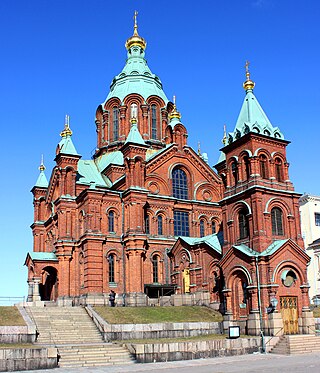
The Orthodox Church of Finland or Finnish Orthodox Church is an autonomous Eastern Orthodox archdiocese of the Ecumenical Patriarchate of Constantinople. The church has a legal position as a national church in the country, along with the Evangelical Lutheran Church of Finland.
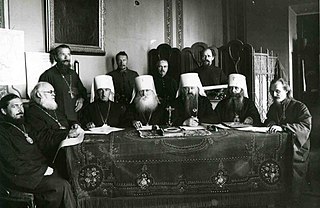
Renovationism —also called the Renovated Church or, by metonymy, the Living Church —officially named Orthodox Russian Church, and later Orthodox Church in the USSR, was the official Christian Church in the Soviet Union from 1922 to 1946, which following World War II was proclaimed as a religious movement that schismed from the Russian Orthodox Church in 1922. Sanctioned by the Soviet authorities, the movement ceased operations in the late 1940s. In 1927, the movement was blessed by the future Patriarch Sergius of Moscow, a political move that enabled the reformation of the modern Russian Orthodox Church in 1943 by Sergius (Stragorodsky).

Konstantin Petrovich Pobedonostsev was a Russian jurist and statesman who served as an adviser to three Russian emperors. During the reign of Alexander III of Russia, Pobedonostsev was considered the chief spokesman for reactionary positions and the éminence grise of imperial politics. Between 1880 and 1905, he served as Over-Procurator of the Most Holy Synod, making him the non-clerical Russian official who supervised the Russian Orthodox Church.

Saint Tikhon's Orthodox Theological Seminary is an Orthodox Christian seminary located in South Canaan Township, Wayne County, Pennsylvania. It is one of three seminaries operated by the Orthodox Church in America, the others being St. Vladimir's Orthodox Theological Seminary in Crestwood, Yonkers, New York, and St. Herman's Orthodox Theological Seminary in Kodiak, Alaska. It is named after Tikhon of Zadonsk.
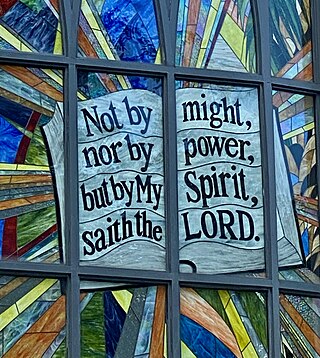
Christians in Singapore constitute 19% of the country's resident population, as of the most recent census conducted in 2020. Christianity is the second largest religion in the country, after Buddhism and before Islam. In 2020, about 37.1% of the country's Christians identified as Catholic with 62.9% labeled as 'Other Christians', most of which identify as Protestant, with some identifying as Orthodox or other minority Christian denominations.

The Most Holy Governing Synod was the highest governing body of the Russian Orthodox Church between 1721 and 1917. It was abolished following the February Revolution of 1917 and replaced with a restored patriarchate under Tikhon of Moscow. The jurisdiction of the Most Holy Synod extended over every kind of ecclesiastical question and over some partly secular matters.

The Ministry of Education of the Union of Soviet Socialist Republics (USSR), formed on 3 August 1966, was one of the most important government offices in the Soviet Union. It was known as the People's Commissariat for Education, or Narkompros, until 1946. Narkompros was a Soviet agency founded by the State Commission on Education and charged with the administration of public education and most of other issues related to culture.
The Procurator was an office initially established in 1722 by Peter the Great, the first Emperor of the Russian Empire, as part of the ecclesiastical reforms to bring the Russian Orthodox Church more directly under his control.
The timeline of Eastern Orthodoxy in North America represents a timeline of the historical development of religious communities, institutions and organizations of Eastern Orthodox Christianity in North America.
The Turkmen of Turkmenistan, are predominantly Muslims. According the U.S. Department of State's International Religious Freedom Report for 2022,
According to U.S. government estimates, the country is 93 percent Muslim, 6.4 percent Eastern Orthodox, and 0.6 percent other. There are small communities of Jehovah's Witnesses, Shia Muslims, Baha’is, Roman Catholics, the International Society for Krishna Consciousness, and evangelical Christians, including Baptists and Pentecostals. Most ethnic Russians and Armenians identify as Orthodox Christian and generally are members of the Russian Orthodox Church or Armenian Apostolic Church. Some ethnic Russians and Armenians are also members of smaller Protestant groups. There are small pockets of Shia Muslims, consisting largely of ethnic Iranians, Azeris, and Kurds, some located in Ashgabat, with others along the border with Iran and in the western city of Turkmenbashy.
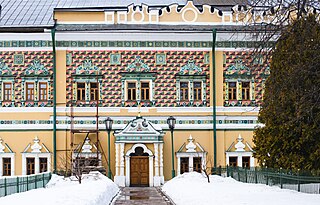
Moscow Theological Academy is a higher educational institution of the Russian Orthodox Church, training clergy, teachers, scholars, and officials.
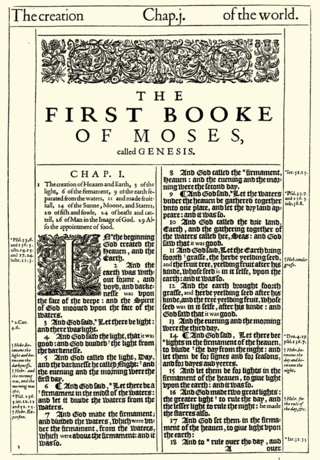
17th-century missionary activity in Asia and the Americas grew strongly, put down roots, and developed its institutions, though it met with strong resistance in Japan in particular. At the same time Christian colonization of some areas outside Europe succeeded, driven by economic as well as religious reasons. Christian traders were heavily involved in the Atlantic slave trade, which had the effect of transporting Africans into Christian communities. A land war between Christianity and Islam continued, in the form of the campaigns of the Habsburg Empire and Ottoman Empire in the Balkans, a turning point coming at Vienna in 1683. The Tsardom of Russia, where Orthodox Christianity was the established religion, expanded eastwards into Siberia and Central Asia, regions of Islamic and shamanistic beliefs, and also southwest into Ukraine, where the Uniate Eastern Catholic Churches arose.

The Saint Petersburg Theological Academy is a higher education institution of the Russian Orthodox Church, located in Saint Petersburg, Russia. The academy preparing theologians, clergymen, singers and icon writers for the Eastern Orthodox Church and grants bachelor, master, candidate and doctorate degrees. It was founded in 1797 by Metropolitan Gabriel (Petrov) of Saint Petersburg, as part of the Alexander Nevsky Lavra.

Alexander Ivanovich Turgenev (Russian: Алекса́ндр Ива́нович Турге́нев; was a Russian statesman and historian.

Patriarch Neophyte was the Patriarch of All Bulgaria, head of the Bulgarian Orthodox Church from 24 February 2013 until his death on 13 March 2024. Prior to his election, he was the Metropolitan Bishop of Ruse (2001–2013) and Bishop of Dorostol and Cherven (1994–2001).
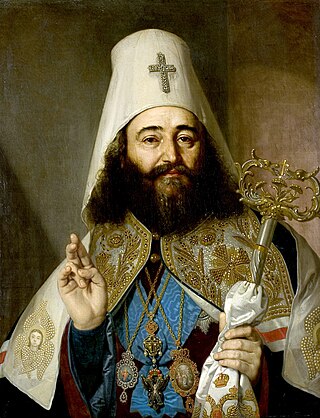
Anton II the Great Martyr, born Prince Royal Teimuraz, was a member of the Georgian royal family and churchman. A son of Heraclius II, the penultimate King of Kartli and Kakheti, he was the Catholicos Patriarch of Georgia from 1788 to 1811.
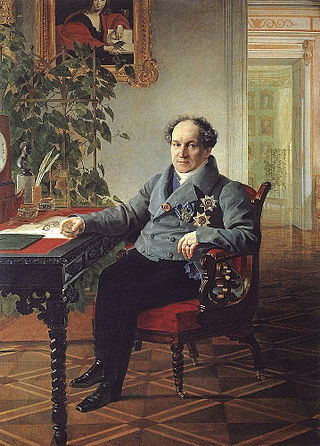
Prince Alexander Nikolayevich Golitsyn was a statesman of the Russian Empire, in 1803–1816 he served as Procurator of the Most Holy Synod, and in 1816–1824 he served as Minister of Education, an Active Privy Councilor of the 1st Class (1841). The confidant of Alexander I, who until the end of his life treasured him with "closeness and advice".
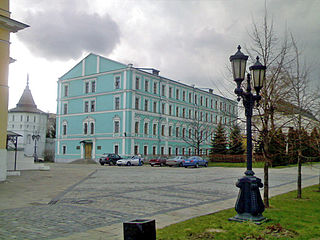
The Department for External Church Relations of the Moscow Patriarchate (DECR) is one of the synodal institutions of the Russian Orthodox Church. It was established on 4 April 1946.
















